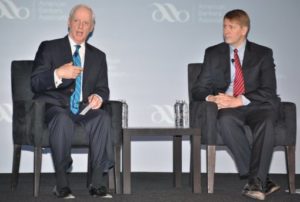In an unrehearsed, question-and-answers session at the American Bankers Association’s annual convention, Consumer Financial Protection Bureau Director Richard Cordray didn’t mince words about the bureau’s mortgage rules which take effect in January 2014. After implementation, regulators will need a few months before they can examine around the new rules in a meaningful way, he said, adding that regulators will work with banks so long as they make good faith efforts to comply with the rules.
The CFPB originally turned down ABA when the association invited Cordray to speak at its annual convention. Cordray overruled his staff and attended the meeting in New Orleans on Oct. 21. In addition to his speech, he also participated in a question-and-answers session after his speech. ABA President Frank Keating posed him questions about the bureau’s mortgage rules.
Keating asked Cordray to address bankers’ concerns over a possible increase in attorney general litigation after the mortgage rules take effect. “You are not going to see an outburst of litigation in the first few months after the rules take effect. There will not be enough [complaint] data,” replied Cordray, who was the attorney general for the state of Ohio before leading the CFPB.
For bankers concerned about making non-QM loans, “I have said it and said it until I am blue in the face, I will say it again today, if you make loans according to an underwriting model you have used consistently for years and those loans have performed well during the worst economic downturn of our lifetime then you should continue to do those loans whether they qualify as a QM loan or not,” Cordray said. “It would be a bad decision to not make performing loans because of a misplaced concern over the CFPB’s mortgage rules. I believe the effects of these rules have been over-blown, these changes will be better for mortgage providers and they are binding for your nonbank competitors.”
Cordray said that compliance burden and cost is a concern for the bureau. “We try to construct our rules to apply differently to larger institutions than they do to smaller institutions,” he said, noting that the CFPB will release a study in coming months on the cost of compliance. “We want to preserve relationship lending in this country,” he said.
“Before the crisis, loans were made that were not sustainable. You knew they were not sustainable. You turned those consumers down for the loan,” he continued. “But the customer went down the street and got the loan from someone else, and they blew up the economy. We need to make sure that doesn’t happen again, but that doesn’t mean oppressing your relationship-lending model any more than is absolutely unavoidable. We want to listen to you and understand how our rules affect you.”
The tone of Cordray’s Q&A continued that of his speech in which he described the CFPB as an advocate for community banking in standing between banks and the onerous mortgage rules of the Dodd-Frank Act. The law contained impractical and difficult provisions that would have gone into effect in January 2013, Cordray said. If not for the CFPB, banks would have been under these rules nine months ago, without guidance from the CFPB to resolve ambiguities, he added.

The CFPB took on the immense project of crafting its mortgage rules in a short 18-month timeframe because the bureau shares banks’ goal of an economic recovery that supports the credit aspirations of responsible consumers, Cordray said from the podium at the meeting’s first general session. “The central concept behind this project is our belief that compliance with regulations is a concern we all share, because successful compliance is good for everyone – consumers, industry, and regulators,” he explained. “We believe that working together makes the process go more smoothly, attains greater understanding, and helps achieve better results.”
Under Dodd-Frank “you would not have been permitted to charge any points or fees on any loan on which you paid compensation to any loan originator, regardless of whether that was your own employee or a mortgage broker,” Cordray explained. “The law also would not have provided a clear safe harbor against litigation to all prime Qualified Mortgage loans, as our rules now do. And the law made no special provision for creditors with less than $2 billion in assets and making less than 500 mortgages per year [that hold mortgages in their portfolios]. We made this change in our rules to reflect our deeply held view that community banks did not engage in the kinds of irresponsible practices that gave rise to the financial crisis.”
In response to ABA’s call for a delay in the effective date for the bureau mortgage rules, Cordray said Congress “basically” specified the effective date to be January 2014. It was “with good reason” that Congress did this, Cordray said. “For there are many moving parts that are dependent upon them, and the mortgage market cannot attain certainty going forward if those parts continue to move…Many of you and your colleagues have told us that you need certainty in order to plan and in order to execute. In no single market is certainty more important than in the recovering mortgage market,” he said.
While it is the CFPB’s job to bring new levels of accountability to the financial products, Cordray said the bureau also recognizes that consumers bear their own share of responsibility for how they participate in the financial marketplace. “Consumers need to put themselves in position to make sensible decisions that they can live with over the entire course of their lives,” he said in his closing remarks about financial education. “They need to recognize that the best form of consumer protection is self-protection: avoiding problems before they occur and the damage is done.”


